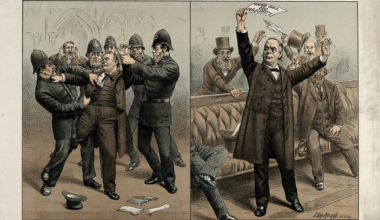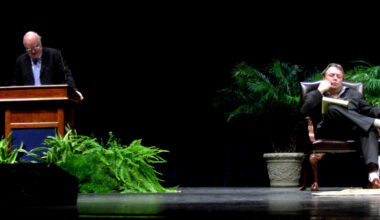
There is a pattern that usually occurs when a senior politician resigns or is chucked out of their job. First comes the emotion-laden speech, during which they will wax lyrical about the privilege of serving in public office. Second, the much-needed sabbatical, where they can spend time with the spouses and families they have barely seen since they were elected. And lastly, the lucrative deal with a publisher to write and publish the memoir of their time in office.
The political memoir is the most sordid literary genre out there. Disgraced and failed politicians are given exorbitant advances by publishers to write, or have written for them, mediocre and self-serving memoirs that few within the public will read—or have even the faintest desire to read. The memoir is the ultimate payday for the disgraced politician who has to put themselves out there in the market again to secure their professional future. A memoir ought to be fascinating, insightful, even moving. It should give readers an insight into the character and personality of the person behind the public persona, as well as just telling the author’s side of the story. And, of course, political memoirs should reveal the inner workings of politics: the backroom deals, the sandbagging, and the scandals. Except, most of the time, such memoirs are public relations exercises in which insight is scarce and cheap score-settling is rife. Their authors usually care only about downplaying their failures and claiming they were misunderstood and undervalued all along.
‘This book is not a traditional political memoir,’ opens Liz Truss in her recently released contribution to the genre, Ten Years to Save the West. In one way, she is correct: this isn’t a typical political memoir, since Truss received a paltry £1,500 advance compared to the £500,000 and £1,000,000 advances that Boris Johnson and David Cameron received, respectively, for their memoirs. In other ways, it is all too typical. Truss’s retelling of her 49-day stint as Prime Minister is narcissistic, with the usual pointless score-settling, whether against Nick Clegg or Polly Toynbee. Moreover, there is virtually no self-reflection and she indulges in a nauseating amount of self-pity.
‘Saving Western civilisation’ has been a sub-genre unto itself, especially on the right, for a long time, and Truss has ticked all the usual genre conventions. Truss argues that ‘the West has lost its way’ and long since become ‘decadent’ and ‘complacent’; the education system has been colonised by ‘wokeism’, making us hate our own heritage; big business is enthralled by ‘“wokenomics,” where they are more focused on so-called environmental, social and governance objectives than making money’; and anti-capitalist leftists and environmentalists with their Net Zero obsession threaten future prospects of economic growth and progress. She doesn’t forget to name-drop Michel Foucault as supposedly being the godfather of identity politics, even though anyone who seriously knows anything about Foucault would understand that he saw identity politics as a form of ‘essentialism’—i.e. turning something that is a social and cultural construct into an ontology—and opposed it for that reason.
If that wasn’t bad enough, Prime Minister Truss was going to stop the rot and save the West with a radical programme of supply-side economics but was undermined and overthrown by the ‘economic establishment’, the administrative state, and her rivals within the Tory party who didn’t accept her as leader.
The subtitle of the book is ‘leading the revolution against globalism, socialism, and the liberal establishment’, which clearly shows that she is trying to pivot to a radical right audience. Yet this new animus towards globalism is a baffling triangulation. For most of her career, Truss has been advocating for what many would call a neoliberal form of capitalism. She was originally for the UK staying in the European Union. Even when she became a Brexiteer, it was so that Britain would become more ‘global’. She has always been a partisan of free trade. As Prime Minister, she even moved to liberalise immigration rules to grant more VISAs to newcomers. In her memoir, she defends her policy ideas, from education to the economy, by saying that she wanted to make Britain more ‘competitive’ in the global marketplace.
On foreign policy, she is a thorough Atlanticist. She is firm in her support for arming Ukraine against Russian aggression, advocates a ‘restoration of British and American exceptionalism’, and wants to see a new ‘coalition of the willing’ against rogue states such as China, Iran, and Russia. Isn’t this Atlanticism an example of the globalism that her desired allies on the radical right would detest?
When Truss calls herself a ‘conservative’, she really means that she supports a conservative form of liberalism: low taxes, free trade, and the downsizing of the state against progressive liberalism, which is based on higher taxes and more state intervention in the economy. What she seeks to ‘conserve’ is the post-Cold War world order based on Anglo-American hegemony that has been in crisis for the past decade. This isn’t the radical, anti-establishment politics she portrays herself as representing.
Truss’s chief complaint about her failed tenure as premier is that unelected officials and bureaucrats failed to respect her mandate. This only begs the question: what mandate?
For someone who is supposed to be an avid defender of capitalism against anti-capitalist leftists, she doesn’t get how much of the big government and the administrative state that she lambasts is actually essential to the functioning and management of capital accumulation and the capitalist system as a whole. What she calls ‘socialism’—overbearing statism that intervenes invasively in people’s lives—is already served up to us by contemporary capitalism. Think, for example, of the ‘nanny state’, so detested by Truss. You don’t have to be a Marxist to understand this point.
Truss’s chief complaint about her failed tenure as premier is that unelected officials and bureaucrats failed to respect her mandate. This only begs the question: what mandate? She wasn’t voted in democratically by the British public, nor was she even supported by most Conservative MPs in her bid to take over after the implosion of the Boris Johnson administration. Truss became Prime Minister because she was selected by the Tory membership in an internal, closed-off party contest. Then she banked on the markets instead of the British public to support her programme and the markets did her in. That’s the entire story of her premiership (admittedly, it wouldn’t make for a very long or a very interesting memoir).
Ten Years to Save the West is the work of a failed politician whose historical legacy will be the unprecedented shortness of her premiership. She is now pivoting to the next stage of her career and trying her luck as an anti-establishment populist. Except she is repackaging very established ideas as ‘radical’ and ‘anti-establishment’. It is true that Western economies have been in a rut and that we desperately need a radical programme to generate more wealth and greatly improve people’s standards of living. But we didn’t need Liz Truss to tell us that. She was never the saviour of the West. Her policy ideas did not have democratic legitimacy and would not have worked. While Britain is still not in a good way politically and economically, it is no worse off than if Liz Truss was still in power—or had never existed at all.
Further reading
‘This rebarbative profession’ – Rory Stewart’s ‘Politics on the Edge’, reviewed, by Daniel James Sharp








Your email address will not be published. Comments are subject to our Community Guidelines. Required fields are marked *
Donate